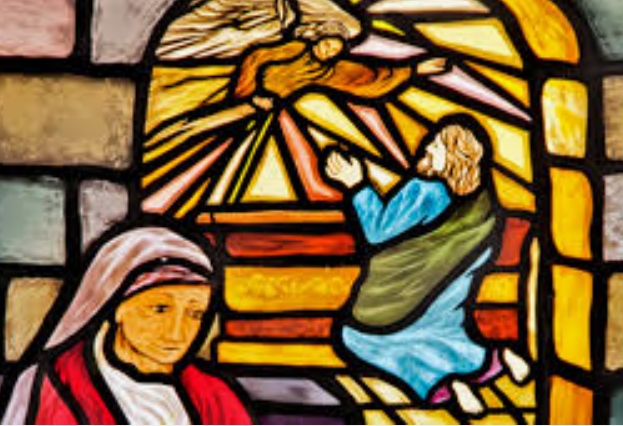Part XI.
![]()
![]()
(0A) Zechariah (Heb.) זְכַרְיָה Zekariah; Greek, Ζαχαρίας Zacharias ; Qur'anic Arabic زَكَرِيَّا Zakariyya
Elizabeth (0B) - mentioned and named in the New Testament but not mentioned in the Qur'an.
They were the parents of (26) John the Baptist - Yaḥyā and associated sacred Books.
Elizabeth was the wife of the Aaronic priest Zachariah-Zakkariyya and the mother of John the Baptist - See New Testament Luke Ch.1, etc.

Zechariah, the father of John the Baptist (fl. 1st cent. BCE/CE., Lk 1, etc)
Zechariah, the father of John the Baptist was a priest among the descendants of Aaron according to the New Testament Gospel of Luke (1:67–79). His wife was named Elizabeth who was counted a relative of the Virgin Mary, mother of Jesus Christ (Luke 1:36).
He is seven times mentioned in four sūras of the Qur'an ( 3:37f; 6:85; 19:2f, 21:89). He had charge of Mary, the mother of Jesus in the Jerusalem Temple (Q. 3:37f). Despite his advanced age and the barrenness of his wife (Elizabeth) God granted him the (allegedly) uniquely named son Yaḥyā (Q.19:7b). In Islamic sources he is one of the ultra pious believed to have suffered cruel martyrdom.
Bābī- Bahā’ī sacred writings.
Zechariah - Zakkariyya' is occasionally mentioned in Bābī- Bahā’ī primary sources. Both the Bāb and Baha'u'llah refer to traditions of his martyrdom.
XXVI
![]()
26. Yaḥyā B / (N) = John the Baptist (> Syr. Yoḥannan?) executed by Herod Antipas c. 29-34 CE. He apparently renounced the priesthood, lived as an ascetic, announced the near advent of the kingdom of God and preached a baptism of repentance. Very few details are given in the Q. where he is five times mentioned in 4 sūras (Q. 3:39; 6:85; 19:7,12; 21:90). The angels make mention of his birth as muṣaddaq anbi-kalimati min Allāh (one "confirming a Word [= Jesus] from God" Q.3:39). Given ḥikma (wisdom, judgement) as a child he was exhorted to "take firm hold of the Book (kitāb = the Torah) (Q. 3:46). Yaḥyā is called a sayyid (leader, authority) and his piety is celebrated, "and [We gave him Yaḥyā] ḥannān (compassion, tenderness) from Us and zakat (goodness, purity); making him taqī (pious, godfearing, devout) and kind to his parents, neither arrogant nor rebellious" (Q.19:13-14).
Though the Bāb rarely mentions Yaḥya, Baha'u'llah quite frequently referred to him and cited the New Testament record of his words (e.g. IQ: 95ff). This especially during the Edirne-Adrianople period (1863-8) when he was countering the emergent Azalī Bābism of his half-brother Mīrzā Yaḥyā Nūrī (c. 1841-1914). To this end Baha'u'llah cited both the bible and Q. in his establishing his own claims. In his K. Badī` (c. 1868), for example, Baha'u'llah specifically established a typology between himself and Jesus [59] and between the Bāb and John the Baptist:
By God! The theopahny (ẓuhūr) of the Primal Point [of Reality = the Bāb] and
this most wondrous, most splendid theophany [= Baha'u'llah] is the exact
correspondence of the theophany of Yaḥyā ibn Zakariyya (= John the Baptist)
and the Spirit of God [= Jesus] (K. Badī`,114).1
1This typological parallelism is also spelled out in other alwāḥ of BA*. See especially his Sūrat al-asmā’ (IQ:95ff )
Though the Q. refers to Yaḥyā (John the Baptist) as a nabī (prophet), Baha'u'llah in his Kitab-i Badī` apparently elevates the status of Yahya to that of a rasūl (a sent Messenger) and the herald of a rasūl (= Jesus). This in the light of the fact that both he (Baha'u'llah) and the Bāb were maẓhar-i ilāhī (= rasūl):
Yaḥya was a nabī (prophet) and a rasūl (envoy-messenger) from God and, moreover, a herald of the forthcoming theophany (ẓuhūr) [of Jesus]. Wherefore did he say, "O people! I announce unto you the glad-tidings of the Kingdom of God and it has assuredly drawn nigh… (K.Badī`,114).
Extending further this typological parallelism, Baha'u'llah associates Yaḥya-John the Baptist with a new religious law (shari`a) and with the baptizing Sabaeans (=, Ṣābi’ūn, Q. 2:62; 5:69; 22 :17 = Mandaeans?]), remnants of whom exist today in southern Iraq, Iran, the USA and other western locations (Drower, [1937] rep.1962; Gunduz, 1994). As Azalī Bābīs adhered to Bābī legalism and continued to await a future messianic theophany so, Baha'u'llah states, did the followers of Yaḥya (John the Baptist = "Sabeans" = Mandaens) act similarly by continuing to await the appearance of a saviour (K.Badī`, 114ff; AA 4:233) .



